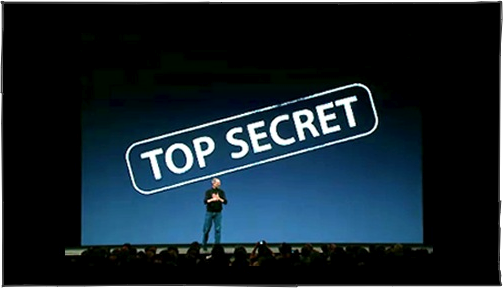





Apple has long been notoriously secretive about its unreleased products. Critics compare Apple's secrecy against the transparent development efforts of open source projects, and even with other commercial developers. Microsoft, for example, has a history of providing detailed roadmaps of future plans. Why does Apple keep its future plans under wraps?
It's not because Apple has nothing to show; in the article Windows 5x More Expensive than Mac OS X, I presented how Apple has served up five times as many significant new revisions to Mac OS X, and more than thirty times as many free regular feature updates.
From a trailing position in 2000, Apple quickly caught up in the OS tech race, and eventually surpassed the feature set Microsoft intended to release in Vista, well over two years in advance, with Tiger. Next year’s Leopard will extend Apple’s technical lead.
Top Secret Leopard Features Unleashed! presented the two sets of features in each new release of Mac OS X: the flashy half, made up of user focused features with clever names and shiny, translucent icons, and the invisible half of new 'under the hood' technologies. While harder to market in a flashy way, those invisible half features often end up providing more value to users.
For example, every new generation of Mac OS X has made the same hardware feel faster. That's pretty remarkable, given the new layers of technologies Apple has been adding to the platform. This has a lot to do with the foundation Apple has been working upon; I describe more about why that's the case in the series of articles called The Rise and Fall of Platforms.
The Top Secret Withholding of Features
If Apple is doing so well in delivering new features, why were some features left under wraps at WWDC? After all, Microsoft has long used early announcements of future plans to overshadow and divert attention from competitors' existing products. Why isn't Apple doing this with Leopard?
There are multiple reasons. First, consider how Microsoft's early announcements have backfired with Vista over the last six years. Microsoft was forced to return to the drawing board more than once, and has discarded key pillars of Longhorn, notably the WinFS object / database file system Microsoft originally started promoting back in 1991.
If Microsoft hadn’t made a huge production of features still under development, it would not have been forced to attempt to deliver ideas that didn’t work out as planned. Instead, the company first desperately scrambled to ship unworkable technology, and was then left embarrassed when it was clear they couldn’t. Microsoft can get away with making a lot of mistakes in areas that Apple can’t.
There is no doubt that Apple has struggled with engineering problems of its own. In the early 1990s, Apple promoted initiatives like PowerTalk and QuickDraw GX that never seemed to make it off the ground; Apple learned from the experience, Microsoft hasn’t.
While Vista will never be able to live up to the hype generated, Apple doesn't seem to have any problems delivering planned features in recent years. So why not pre-announce everything that is at least functionally complete in Leopard and generate all kinds of free, early excitement for it?
How Apple Makes a Splash
Apple is already rather well versed at generating excitement for their products. Rather than announce "plans" to drum up advance interest in a product, as Microsoft most recently did with their new, solo effort at releasing a non-PlaysForSure iPod Killer, Apple schedules press releases as "Apple Events" to create anticipation for an initial release. Apple Events generally don't even suggest what products are going to be announced!
Actual product details are kept secret so that the first announcement of a product is the first anyone’s heard real details about it. If they can keep it entirely under wraps until it’s ready to sell, then there will be a guaranteed flurry of press right at the moment when people can go out and buy it.
Timing is important, because it's hard to maintain excitement or keep a product in the headlines for a few weeks, let alone months. The flurry of news surrounding Microsoft's iPod rival quickly waned, leaving a bunch of questions in the air that invited criticism. Consumers were left to wonder: Did the announcements Microsoft make reflect a real product, or was it simply market research to gauge the public reaction?
Even worse, the premature announcements not only reinforced the impression that Microsoft is unable to deliver upon its plans, but also made it appear that Microsoft doesn't even have a clue what consumers really want. Is it going to be wireless or not? Was that a tease? Do consumers want to trade their iPod for a wireless pocket computer with no battery life, but instead the ability to download songs directly from the Internet or from other users, particularly since doing so would be hampered by Microsoft's own draconian DRM lock down scheme?
Further how will Microsoft pull off a solo product, after broadly announcing the advantages of “choice” in buying WMA PlaysForSure players from different manufacturers? Why is one Microsoft music store a good idea now, when “choice” in WMA music stores was presented as the better alternative earlier? What do Microsoft’s partners think about being abandoned? Microsoft’s advance announcements left more questions than answers.
Rather than forcing the iPod to compete against a vaporware product illusion, as Microsoft intended, the real effect was to create skepticism that anything Microsoft might deliver would even be comparable to the existing iPod, let alone whatever Apple might deliver in the coming sixth generation iPods. Microsoft's lack of basic features such as support for podcasts helped nail any sense that the iPod would be at all upstaged.
Without any reliable facts, tech reporters were left wondering how to spin a story about the impact such a nebulous product might have. In addition to the timing of announcements, it's also important to clearly present digestible chunks of news so that consumers, and reporters, get the right information, in the right amount, at the right time.
Trained Monkeys
Each Apple Event only gets one or two new products, because that keeps the spotlight on a small selection of items. If, for example, Apple had released minor details of speed bumps across its various product lines at WWDC, the press wouldn’t know what to talk about, and would likely miss the important details.
If you haven’t ever had the pleasure to work with “journalists,” you might not know that most of your news is actually written for you by PR flacks. Today’s journalists can’t be bothered to do much beyond regurgitate the press releases they are handed. That’s why everyone’s coverage of events pretty much sounds the same.
Apple has figured this out, and knows how to make these monkeys dance. Part of that is not feeding them too much or too frequently. Too much press feeding and the media just throws everything up in a big mess, then walks away to find fresh plates of sensationalism elsewhere.
You may have noticed that Apple now releases product updates in weekly feedings. Once the excitement of an event has blown over, they release a speed bump for a major product line at the beginning of the week. The next week gets the next line, and so on for several weeks: iMac, laptop, consumer laptop, desktop, etc.
You may have noticed that Apple now releases product updates in weekly feedings. Once the excitement of an event has blown over, they release a speed bump for a major product line at the beginning of the week. The next week gets the next line, and so on for several weeks: iMac, laptop, consumer laptop, desktop, etc.
Once everyone’s had enough of Apple bumps, the company goes quiet for a while until the whole world freaks out and demands some type of news about something, anything from the company. Sure enough, right about then another Apple Event rolls around.
Beyond the real journalists who are happy to get fed and do tricks for Apple, there are the stray dog bloggers that don’t do tricks, and will eat any garbage that anyone might throw them. By trying to get details out of developers and manufacturers who have signed confidentiality agreements, these rumor websites only deflate the excitement surrounding an event for their own short term ad-click profit.
That’s no good for Apple, and it rains on the dance they play with the press. It’s also deflating for customers, because the regular excitement they get from dramatic Apple events is converted into, “what? we already heard about that” style disappointment. This has contributed to the climate of secrecy above and beyond the normal level of confidential information access common in the tech industry.
Apple is News
Another reason Apple carefully prepares news for the press in small doses has to do with Apple's unique role as a fixture of national headlines. Regardless of whether the news is good or bad, it seems that news about Apple is nearly an obsession for consumers. If Apple doesn't constantly release good news, reporters will make up bad news just to fill the void.
I'll examine why news outlets can't stop talking about Apple in a coming article, and examine specific reports made by reporters and organizations that leech into Apple like parasites in order to call attention to themselves.
Opening the Curtain
While Apple’s secrecy works to its advantage in creating excitement for consumer products, the same secrecy can work against Apple’s efforts to working with partners, particularly in Open Source projects, and in dealing with corporate customers. An upcoming article will look at Apple’s recent efforts to adapt and provide more open information about their future plans.
This Series

| | Comment Preview
 Read more about:
Read more about:

 Send |
Send |

 Subscribe |
Subscribe |
 Del.icio.us |
Del.icio.us |
 Digg |
Digg |
 Furl |
Furl |
 Reddit |
Reddit |
 Technorati
Technorati
Click one of the links above to display related articles on this page.
Why Is Apple so Secretive?
Tuesday, August 29, 2006






Ad








